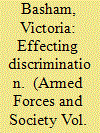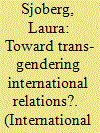| Srl | Item |
| 1 |
ID:
130367


|
|
|
| 2 |
ID:
124110


|
|
|
|
|
| Publication |
2012.
|
| Summary/Abstract |
We can't have both chastity and mixed-sex complements. So what's the priority-a combat-ready Fleet or gender diversity?
|
|
|
|
|
|
|
|
|
|
|
|
|
|
|
|
| 3 |
ID:
088940


|
|
|
|
|
| Publication |
2009.
|
| Summary/Abstract |
In recent years, the British military has introduced a number of policies aimed at recruiting and sustaining demographically diverse armed forces. Central to these is a "zero-tolerance" approach to discrimination and harassment. However, by undertaking an "effective" reading of policies aimed at managing sexual orientation and gender diversity, and by drawing on qualitative research with members of the British forces, this article demonstrates how the military's own implementation strategies facilitate discrimination against some recruits. It concludes that although the British military is understandably keen to protect its operational effectiveness, by clinging to unreflexive claims about the nature of social cohesion, and in failing to respond to societal demands for inclusion, military officials are undermining the social legitimacy of the armed forces. By extension, they are destabilizing, rather than protecting, their capabilities
|
|
|
|
|
|
|
|
|
|
|
|
|
|
|
|
| 4 |
ID:
153811


|
|
|
|
|
| Summary/Abstract |
Gender diversity is good for the study of international relations (IR) and political science. Graduate training is an opportunity for scholars to affect the demographics of their field and the gendered practices within it. This article presents a first-cut investigation of the degree to which gender bias exists in graduate IR syllabi. The author found that the gender of the instructor for graduate courses matters significantly for what type of research is taught, in two ways. First, on average, female instructors assign significantly more research by female authors than male instructors. Second, women appear to be considerably more reluctant than men about assigning their own research as required readings. Some but not all of the difference between male- and female-taught courses might be explained by differences in course composition.
|
|
|
|
|
|
|
|
|
|
|
|
|
|
|
|
| 5 |
ID:
130909


|
|
|
|
|
| Publication |
2012.
|
| Summary/Abstract |
This article engages with trans-theorizing to show how International Relations (IR) is currently blind to gender diversity, and the conceptual contributions trans-theorizing could make. To do so, it asks what insights trans-theorizing might provide for the study of global politics generally, and for feminist theorizing about gender in global politics specifically. After briefly introducing the terminology of trans-theorizing, the article addresses the potential for (and potential hazards of) an alliance between trans-theorizing and feminist theorizing in IR. The article then discusses several potential contributions of trans-theorizing-including hyper- and in-visibility, liminality, crossing, and disidentification-which provide explanatory leverage for IR. The article concludes with some suggestions for further collaboration between trans-theorizing and (feminist) IR to deepen and widen IR's work on gender specifically, and global politics generally.
|
|
|
|
|
|
|
|
|
|
|
|
|
|
|
|